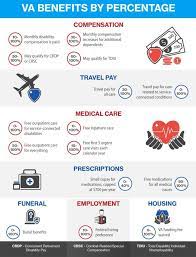VA Service Connected Disability: Understanding Your Benefits
For veterans who have been injured or disabled as a result of their military service, the VA Service Connected Disability program can provide much-needed financial and medical assistance. This program is designed to help veterans who have been injured or disabled during their military service, providing them with compensation and access to medical care.
To qualify for VA Service Connected Disability benefits, veterans must meet certain criteria. First, they must have a disability that was caused or aggravated by their military service. This disability can be physical or mental in nature and can range from minor injuries to severe disabilities that impact daily life.
Once a veteran has been deemed eligible for the program, they will receive compensation based on the severity of their disability. This compensation can range from a few hundred dollars per month to several thousand dollars per month, depending on the level of disability.
In addition to financial compensation, veterans with Service Connected Disabilities are also eligible for medical care through the VA healthcare system. This includes access to doctors, specialists, medications, and other treatments necessary to manage their condition.
It’s important for veterans with disabilities to understand that they have rights under the law. The Americans with Disabilities Act (ADA) prohibits discrimination against individuals with disabilities in areas such as employment, housing, and public accommodations. Veterans with disabilities may also be eligible for additional benefits through state and local programs.
If you are a veteran with a disability related to your military service, it’s important to explore your options for VA Service Connected Disability benefits. The process can be complex and time-consuming but there are resources available to help you navigate it. The VA has trained professionals who can assist you in filing your claim and provide guidance throughout the process.
In conclusion, VA Service Connected Disability is an important program that provides financial assistance and medical care for veterans who have been injured or disabled as a result of their military service. If you believe that you may be eligible for these benefits, it’s important to seek guidance and explore your options. Remember, you have rights under the law and resources available to help you access the benefits you deserve.
Answers to 8 Common Questions About VA Service-Connected Disability Benefits
- How do I apply for VA disability benefits?
- What is the process to file a disability claim?
- What documents are needed to support a service-connected disability claim?
- How long does it take to receive a decision on my VA disability claim?
- How much will I receive in monthly disability compensation from the VA?
- Can I appeal a denial of my VA disability claim?
- Does my service-connected disability qualify me for additional benefits from the VA?
- Do I need an attorney to help me with my VA disability claim?
How do I apply for VA disability benefits?
If you are a veteran with a disability that is related to your military service, you may be eligible for VA disability benefits. Here are the steps you can take to apply for these benefits:
- Gather your documentation: Before you begin the application process, it’s important to gather all of the documentation related to your disability and military service. This includes medical records, service records, and any other relevant documents.
- Determine your eligibility: The VA has specific criteria for determining eligibility for disability benefits. You can find out if you are eligible by visiting the VA’s website or contacting them directly.
- Fill out an application: You can apply for VA disability benefits online through the VA’s eBenefits portal, in person at a regional VA office, or by mail. The application will ask for information about your disability, medical history, and military service.
- Submit your application: Once you have completed your application, submit it to the VA along with any supporting documentation.
- Attend a Compensation and Pension (C&P) exam: The VA may require you to attend a C&P exam to evaluate your disability and determine the level of compensation you are eligible for.
- Wait for a decision: After submitting your application and attending any required exams, you will need to wait for the VA to make a decision on your claim. This process can take several months or longer depending on the complexity of your case.
- Appeal if necessary: If your claim is denied or if you disagree with the level of compensation awarded, you have the right to appeal the decision.
It’s important to note that applying for VA disability benefits can be a complex process. If you need assistance or have questions about the process, consider working with a Veterans Service Organization (VSO) or hiring an attorney who specializes in veterans’ benefits law. These professionals can help guide you through each step of the process and ensure that you receive all of the benefits you are entitled to.
What is the process to file a disability claim?
The process to file a disability claim with the VA can seem daunting, but it is important to understand that there are resources available to help you navigate the process. Here are the general steps involved in filing a disability claim:
- Gather your medical records: Before you file a disability claim, you will need to gather all of your medical records related to the condition or injury that you believe is service-connected. This includes any medical treatment you received while in the military, as well as any treatment you received after leaving the military.
- Complete and submit your application: You can apply for VA Service Connected Disability benefits online, by mail, or in person at a VA regional office. Make sure to fill out all sections of the application and provide as much detail as possible about your condition and how it relates to your military service.
- Attend any necessary exams: The VA may require you to attend one or more medical exams to evaluate your condition and determine its severity. These exams are usually conducted by a VA doctor or healthcare provider.
- Wait for a decision: After submitting your application and any necessary exams, you will need to wait for the VA to make a decision on your claim. This process can take several months or longer, depending on the complexity of your case.
- Appeal if necessary: If your claim is denied, you have the right to appeal the decision through the VA appeals process. This process can be complex and time-consuming, but there are resources available to help you navigate it.
It’s important to note that every case is different and there may be additional steps involved in filing a disability claim depending on your individual circumstances. The best way to ensure that your claim is processed correctly and efficiently is to seek guidance from trained professionals at the VA or from organizations that specialize in assisting veterans with disability claims.
What documents are needed to support a service-connected disability claim?
To support a service-connected disability claim, the following documents may be needed:
- Service Treatment Records: These records document any medical treatment received while in military service and can help establish the existence of a disability.
- Personnel Records: These records include information about a veteran’s military service, such as dates of service, rank, and awards received.
- VA Medical Records: If a veteran has received medical care through the VA healthcare system, their medical records can provide evidence of their disability.
- Private Medical Records: If a veteran has received medical care outside of the VA healthcare system, their private medical records can also provide evidence of their disability.
- Nexus Letter: A nexus letter is written by a medical professional and connects the veteran’s current disability to their military service.
- Social Security Disability Benefits Award Letter: If a veteran has been awarded Social Security Disability benefits for the same condition they are claiming for VA Service Connected Disability benefits, this can help support their claim.
- Lay Statements: These are statements from family members or friends who have observed the veteran’s symptoms or limitations due to their disability.
It’s important to note that not all of these documents may be necessary for every claim. The specific documents required will depend on the individual circumstances of each case.
If you are filing a claim for VA Service Connected Disability benefits, it’s important to gather as much evidence as possible to support your claim. The VA has trained professionals who can assist you in gathering and submitting the necessary documentation.
How long does it take to receive a decision on my VA disability claim?
The amount of time it takes to receive a decision on your VA disability claim can vary depending on several factors. These factors include the complexity of your case, the number of claims currently being processed by the VA, and whether or not additional evidence is needed to make a decision.
The VA has implemented several initiatives in recent years to improve the timeliness of its claims processing. These initiatives include streamlining processes, hiring additional staff, and implementing technology improvements.
However, despite these efforts, it can still take several months or even years to receive a decision on your claim. According to the VA’s website, the average processing time for disability claims is approximately 90 days. However, this is only an average and some claims may take longer.
If additional evidence is needed to make a decision on your claim, this can further delay the process. The VA may request medical records or other documentation from you or other sources to support your claim.
To help expedite the process and ensure that your claim is processed as quickly as possible, it’s important to provide all necessary information and documentation when you file your claim. You should also respond promptly if the VA requests additional information or evidence.
If you have concerns about the status of your claim or if you believe that there has been an error in processing your claim, you can contact a Veterans Service Officer (VSO) for assistance. VSOs are trained professionals who can provide guidance and support throughout the claims process.
In summary, while the VA has made efforts to improve its claims processing times, it can still take several months or even years to receive a decision on your disability claim. It’s important to provide all necessary information and respond promptly if additional information is requested. If you have concerns about your claim status or need assistance with filing a claim, consider reaching out to a Veterans Service Officer for guidance and support.
How much will I receive in monthly disability compensation from the VA?
The amount of monthly disability compensation you may receive from the VA depends on the severity of your service-connected disability. The VA uses a rating system to determine the level of disability and corresponding compensation.
The rating system ranges from 0% to 100%, with increments of 10%. A rating of 0% means that there is a service-connected condition, but it does not warrant any compensation. A rating of 100% means that the veteran is completely disabled and unable to work due to their service-connected condition.
For example, as of 2021, a veteran with a 10% disability rating would receive $144.14 per month, while a veteran with a 100% disability rating would receive $3,146.42 per month.
It’s important to note that these rates can change each year based on cost-of-living adjustments (COLA) and other factors. Additionally, veterans may be eligible for additional compensation if they have dependents or require special assistance due to their disabilities.
If you are unsure about your eligibility for VA disability compensation or want more information about the specific amounts you may be eligible for, it’s best to consult with a VA representative or an accredited Veterans Service Organization (VSO). They can help you understand your options and guide you through the process of filing your claim.
Can I appeal a denial of my VA disability claim?
Yes, if your VA disability claim has been denied, you have the right to appeal the decision. The appeals process can be complex and time-consuming, but it is important to understand your options and take action if you believe that your claim was wrongly denied.
The first step in the appeals process is to file a Notice of Disagreement (NOD) with the VA. This document notifies the VA that you disagree with their decision and wish to appeal. You must file this notice within one year of receiving the decision letter from the VA.
Once you have filed an NOD, your case will be reviewed by a Decision Review Officer (DRO). The DRO will review all of the evidence in your case, including any new evidence that you may have submitted since your initial claim. They will then issue a decision on your case.
If you are still not satisfied with the decision after a review by a DRO, you can request a hearing before a Veterans Law Judge (VLJ). At this hearing, you will have the opportunity to present evidence and argue your case before the VLJ. After reviewing all of the evidence, the VLJ will issue a decision on your case.
If you are still not satisfied with the outcome after a hearing before a VLJ, you can appeal to the Board of Veterans Appeals (BVA). The BVA is an independent body that reviews appeals from veterans who believe that their claims were wrongly denied. The BVA will review all of the evidence in your case and issue a final decision.
It’s important to note that the appeals process can take several years to complete. However, if you believe that your claim was wrongly denied, it is worth pursuing an appeal to ensure that you receive the benefits that you deserve.
In conclusion, if your VA disability claim has been denied, you have options for appealing the decision. The appeals process can be complex and time-consuming but it is important to understand your rights and take action if you believe that your claim was wrongly denied. Contacting a veterans service organization or an attorney who specializes in VA benefits can be helpful in navigating the appeals process.
Does my service-connected disability qualify me for additional benefits from the VA?
Yes, having a service-connected disability can qualify you for additional benefits from the VA. These benefits can include:
- Vocational Rehabilitation and Employment (VR&E) services: If your disability makes it difficult for you to find or maintain employment, the VA offers vocational rehabilitation and employment services to help you develop new skills and find a job that suits your abilities.
- Special Monthly Compensation (SMC): SMC is available to veterans who have very severe disabilities or multiple disabilities that limit their ability to perform daily activities on their own. This benefit provides additional financial support to help cover the costs of care.
- Home Adaptation Grants: If your disability requires modifications to your home, such as wheelchair ramps or widened doorways, the VA offers grants to help cover the cost of these modifications.
- Automobile Allowance: If your disability makes it difficult for you to travel independently, the VA may provide an automobile allowance to help cover the cost of purchasing a vehicle that meets your needs.
- Dependents Educational Assistance Program (DEA): If you have dependents who are pursuing education or training, they may be eligible for educational assistance through the DEA program.
These are just a few examples of the additional benefits that may be available to veterans with service-connected disabilities. It’s important to work with a VA representative who can help you understand all of the benefits for which you may be eligible based on your specific circumstances and needs.
Do I need an attorney to help me with my VA disability claim?
While it is not required to hire an attorney to help with your VA disability claim, many veterans find it helpful to have legal representation. An attorney who specializes in VA disability claims can provide valuable assistance throughout the process, including:
- Helping you understand the eligibility requirements for VA disability benefits and ensuring that you have all the necessary documentation to support your claim.
- Assisting with the preparation and submission of your application for benefits, including gathering medical records and other evidence.
- Representing you at hearings and appeals if your initial claim is denied or if you disagree with the rating assigned by the VA.
- Providing guidance on other legal issues that may arise during the process, such as employment or housing discrimination based on your disability status.
However, it’s important to note that hiring an attorney can be expensive. Some attorneys charge hourly fees or a percentage of any back pay that you receive if your claim is approved. Before deciding whether to hire an attorney, it’s important to weigh the potential costs against the potential benefits.
Ultimately, whether or not you choose to hire an attorney for your VA disability claim is a personal decision that depends on your individual circumstances. If you are unsure about whether an attorney could be helpful in your case, consider speaking with a veterans service organization or other resource for guidance.




